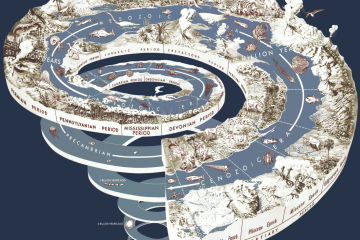Eroding Democracy

In the state of Florida, we have what is called “the sunshine law.” This law was initially meant to curtail corruption at the state level government. As a state employee at Florida International University, for instance, under these laws my salary and all salaries at the university are posted for public information. This means that I’m able to go in and see what my colleagues make at the professorial level, and see what types of economic inequity exist. I can also see the salaries of all the administrators in the university, and this gives me an overall picture of the economic inequities that exist at my institution. Furthermore, all communications and meetings are “open to the public,” meaning that anyone could attend a faculty meeting or committee meeting, and anyone could ask to see the history of my emails, etc. In theory, I’m for transparency, but under the new far right-wing governor, Ron DeSantis, transparency is turning into surveillance.
Any student can, for instance, record and post my lectures or any other conversation we might have. What does this surveillance do to the classroom? In short it leads to the self-censuring and self-policing of faculty who don’t have tenure or are not on the tenure track. Furthermore, it means students don’t have a safe space in which to freely explore ideas, discourse, and ideology. In an era where right-leaning students are looking for any excuse to expose the left-leaning ideology of the professoriate, and to confirm the left-leaning bias of other university students (and thus confirm the way in which the right-leaning student is oppressed in the university system), the ability to record classroom situations functions as a panopticon of sorts.
On the other side of the isle, students who are left-leaning are very willing to cancel other students who may not have the correct terminology to refer to a person’s race, gender, sex, sexuality, etc. The cancel culture on the left has become just as dictatorial as the right ideology against which it fights. Again, this means that students do not have a free space to discuss ideas. Without such space, the space of democracy in the Arendtian sense, there is little room for dialogue and working together toward a different future. Rather, all is reduced to an ideology war in which the most votes and those with the most power win. It is the end, in other words, of democracy itself.
I am in no way equating the violence caused by the ideology on the right and that on the left. The attack on Diversity, Equity and Inclusion (DEI), on trans, queer, and women’s bodies, and on environmental concerns on the part of the right causes way more personal, social, and ecological violence than the cancel culture on the left. The ways in which the right uses the language of DEI to attack DEI is deplorable. Many on the right argue that DEI gives certain bodies an unfair advantage while discriminating against white, cis, straight men and women. The so-called “don’t say gay” bill that led to the removal of all LGBTQ books from public school classrooms from Kindergarten to the 12th grade in the state of Florida is one example of this. The attack on drag performances and gender queer bathrooms is another. Most recently, I have been on a committee at my university that is reviewing the core curriculum in light of new state legislation that states no core course can be: “based on theories [arguing] that systemic racism, sexism, oppression, and privilege are inherent in the institutions of the United States and were created to maintain social, political, and economic inequities.” In other words, we are being asked to teach fake history. This legislation is effectively the policing and demoting of certain bodies and rhetoric and the idealizing of a rhetoric that supports a certain body type.
I have also over the years seen left-leaning academics begin to believe in the rhetoric against affirmative action and DEI policies. As a white male, I have heard other white men in the academy say: well, if I were black, or a lesbian, or anything other than a cis white male, I’d get the job. The insidious nature of these divisive ideas is further eroding the spaces of free speech on all sides of the isle. Male students (many of whom are cis and white) are also leaving the university system in larger numbers; perhaps because they have been told by the left that patriarchy (and particularly cis-white patriarchy) is the root of all of our problems and that, according to right ideology, the university is just brainwashing and grooming for the new left. In other words, these students who have been historically privileged feel now that they are discriminated against. I don’t, of course, agree with the logic that says this group of people (cis white males) are discriminated against. However, I also see the problem of not providing spaces in which the multiple constituencies of the university can come together and have open, critical dialogue.
These attacks on the spaces of free thinking are only going to lead to further divisions as the right and left become more polarized and shout louder and louder in their own echo chambers. The more convinced each side becomes of its own way of thinking, the less we will be able to create spaces for political dialogue, and the more demagogic and less democratic we become. Though I’m speaking from my own context in the US, this is happening in many other places around the world as various stripes of nationalism, xenophobia, and other “isms” are on the rise. Part of the problem, I’d argue, is the certainty that both sides feel. But, how can we really be so certain about anything when a word and concept like “transparency” comes to mean “surveillance,” and when “anti-discrimination” becomes the reason to discriminate? And, maybe we should be a little more uncertain in a cancel culture so frenzied that anyone who questions the logic and soundness of left ideology gets silenced and ostracized.
Which side will do the work of “calling the other in”? How can we call each other out, dialogue together, and then create new spaces for more voices? In part, we need to think in ways that give us what O’niel van Horn calls “dark hope.” “Dark hope” means “faithfully inhabiting the present precisely by not discounting the entangled inheritances of traumas, contaminations, histories.” (p. 104). We inherit worlds that treat different bodies differently through the evolution of habits, discourses, and institutions that promote certain ways of being in the world over others. The darkly hope-filled spaces for listening, critical dialogue, and healing are crucial if we are to build strong, multi-perspectival planetary democracies in the future.
#
Whitney A. Bauman is Professor of Religious Studies at Florida International University (FIU) in Miami, FL. He is also co-founder and co-director of Counterpoint: Navigating Knowledge, a non-profit based in Berlin, Germany that holds public discussions over social and ecological issues related to globalization and climate change. His areas of research interest fall under the theme of “religion, science, and globalization.” He is the recipient of a Fulbright Fellowship and a Humboldt Fellowship, and in 2022 won an award from FIU for Excellence in Research and Creative Activities. His publications include: Religion and Ecology: Developing a Planetary Ethic (Columbia University Press 2014), and co-authored with Kevin O’Brien, Environmental Ethics and Uncertainty: Tackling Wicked Problems (Routledge 2019); 3rdedition of Grounding Religion: A Fieldguide to the Study of Religion and Ecology, co-edited with Kevin O’Brien and Richard Bohannon, (Routledge 2023). He is also the co-editor with Karen Bray and Heather Eaton of Earthly Things: Immanence, New Materialisms, and Planetary Thinking (Fordham University Press 2023). His next monograph is entitled, A Critical Planetary Romanticism: Literary and Scientific Origins of New Materialism (Columbia University Press, Forthcoming 2024).
Counterpoint blogs may be reprinted with the following acknowledgement: “This article was published by Counterpoint Navigating Knowledge on 13 December 2023.” The views and opinions expressed on this website, in its publications, and in comments made in response to the site and publications are those of the author(s) and do not necessarily reflect the views and opinions of Counterpoint: Navigating Knowledge, its founders, its staff, or any agent or institution affiliated with it, nor those of the institution(s) with which the author is affiliated. Counterpoint exists to promote vigorous debate within and across knowledge systems and therefore publishes a wide variety of views and opinions in the interests of open conversation and dialogue.
Photo credits: “Pile of old books.” Free download from Publicdomainpictures.



0 Comments